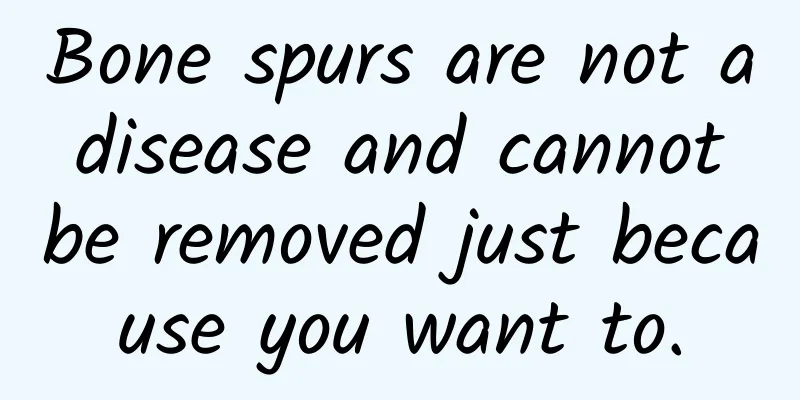Bone spurs are not a disease and cannot be removed just because you want to.

|
When orthopedic surgeons are doing outpatient work, patients often ask: "Doctor, my heels and knees hurt, and an X-ray shows that I have bone spurs. What medicine can I take to get rid of the bone spurs? Can I have a small operation to remove them?" What exactly are bone spurs, why do they cause pain, and are there any good ways to treat them? Today's popular science article will help you unravel the mystery of bone spurs. 1. Bone spurs are neither a disease nor a thorn. "Bone spurs" are what we usually call bone hyperplasia. They are caused by the wear and tear of cartilage in joints due to various reasons. They are bony protrusions, also known as osteophytes. Bone spurs look like thorns in imaging reports, so they are called this. In fact, there is no diagnosis of bone spurs in textbooks. Therefore, bone spurs are not what we usually imagine: bone spurs are foreign bodies that pierce the flesh like thorns, causing pain and numbness. Bone spurs are a natural aging phenomenon, just like wrinkles on the face and aging of the human body. They are not a disease. On the contrary, the formation of bone spurs is the result of a self-protective reaction of the human body. 2. The formation of bone spurs actually protects the joints Bones and joints are a complex mechanical system. When people reach a certain age, as their joints age, the structures that maintain joint stability, such as muscles and ligaments, become loose, joint stability decreases, and joint mechanics change, promoting the formation of bone spurs. The formation of bone spurs restores joint stability. So in this sense, bone spurs are good for the human body. Therefore, the joints that mainly bear the body's weight and movement are prone to bone spurs, such as the cervical vertebrae, lumbar vertebrae, knee joints, heels, etc. 3. Since bone spurs are not a disease, why do they hurt so much? Most people's understanding of bone spurs is that it will definitely hurt if you have bone spurs. Bone spurs pierce or pierce the flesh, so it will definitely hurt! In fact, most bone spurs are asymptomatic and are often discovered accidentally during physical examinations or radiological examinations for other diseases. Some bone spur patients feel pain or movement disorders, which are not caused by the bone spurs themselves, but because the bone spurs compress the nerves, tendons or other structures of the surrounding tissues, resulting in symptoms such as numbness/pain in the hands and feet, joint stiffness, and muscle weakness. The specific symptoms depend on the location of the bone spur. It should be made clear that the most common cause of joint pain is aseptic inflammation of local joint tissues, but many people blame this on the bone spurs. 4. Do bone spurs need to be treated? Bone spurs are a self-protective reaction of the human body after aging. If there is no pain or any symptoms, just leave it there and ignore it. If there is obvious joint pain that affects work and life, then treatment is needed. Conservative treatment is preferred: ① Rest: reduce joint activity to avoid aggravating symptoms; ②Medications: Anti-inflammatory and analgesic drugs to relieve pain; ③Physical therapy: ultrasound, infrared, electrotherapy and traction, etc.; ④ Traditional Chinese medicine treatment: massage, acupuncture, etc. When bone spurs compress nerves or significantly limit joint movement, surgical treatment may be required. Everyone should remember one thing: bone spurs are essentially bone tissue. No medicine can eliminate bone spurs. Never believe in those "magic drugs" that claim to be able to eliminate bone spurs. 5. How to take care of yourself when you have bone spurs? Moderate exercise: It does not mean that you cannot exercise if you have bone spurs. Appropriate exercise will strengthen the muscles and ligaments around the joints and increase joint stability. For example, walking, cycling, swimming and other exercises that put less load on the knee joints. Lose weight: Excessive weight can accelerate joint wear. Appropriate weight loss can reduce the pressure on the knee joint, slow down joint wear, and thus inhibit the formation of bone spurs. Keep warm and avoid cold and moisture: bones and joints are sensitive to cold and moisture. When exposed to cold and moisture, bones and joints will feel pain. Keeping warm is very important for protecting bones and joints. 6. Summary The vast majority of bone and joint pain is not caused by bone spurs, but by aseptic inflammation in the joints where the bone spurs grow. Only a small number of pains are caused by the bad location of the bone spurs. Therefore, "bone spurs" are not a disease, but are beneficial to the human body. Therefore, bone spurs without symptoms do not need to be treated. Proper maintenance is more effective than taking any medicine! Note: The pictures in this article are from the Internet Author: Dr. Yao Guanyong, Health Management Center, Wuhan Union Hospital |
>>: Obesity not only harms the body, but also the brain?
Recommend
How long does it take to get pregnant after laparoscopic surgery?
After laparoscopic surgery, if you recover well, ...
Lochia becomes lighter and then there is blood
Women will have lochia after giving birth normall...
After giving birth, do you think it will be alright once you regain your weight?
After childbirth, you thought everything would be...
Can I eat oranges during my period?
Oranges are common fruits. When eaten, this type ...
What to do if your breasts are sagging and have no elasticity?
In life, many women are always troubled by the co...
How should office workers maintain health in summer?
I believe everyone is very clear that office work...
Delayed menstruation, breast pain when touched
Many female friends experience delayed menstruati...
Can I do leg slimming exercises during menstruation?
Women will experience various discomforts during ...
China Academy of Information and Communications Technology: China's smartphone shipments in April 2022 were 17.7 million units, a year-on-year decrease of 34%.
Demand for smartphones in the previously red-hot ...
What medicine is effective for less dark menstruation?
When abnormalities are found during menstruation,...
What are the effects of removing the uterus?
The female body needs comprehensive protection, e...
What should I pay attention to during breast radiotherapy?
Among various types of cancer, breast cancer is a...
Strategy Analytics: Global tablet shipments reached 160 million units in 2019
The latest research report released by Strategy A...
There are three reasons for irregular uterine bleeding
The uterus is the main reproductive organ of wome...
What is the nutritional value of sea sprouts? How to make sea sprout scrambled eggs
Sea sprouts are low in fat, calories, and cholest...









